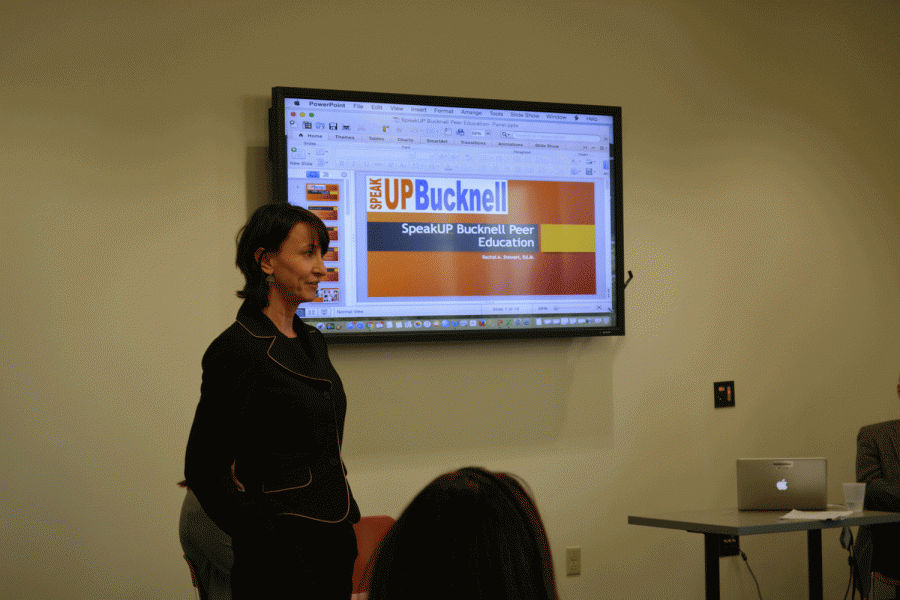Faculty generate awareness for sexual assault in public policy forum
April 14, 2016
The Bucknell Institute for Public Policy (BIPP) hosted an open forum on April 12 to discuss the University’s sexual assault policies as part of the institute’s Pizza and Policy forum series. Three faculty panelists, Associate Professor of Psychology Bill Flack, Title IX Coordinator and Clery Act Compliance Officer Kate Grimes, and Interpersonal Violence Prevention Coordinator Rachel Stewart facilitated.
Flack began the forum by discussing his ongoing research about sexual assault on campus. He has concluded that, according to the parameters of his research, the University’s rate of rape or attempted rape is 25-30 percent of all students, which is higher than the national collegiate rate of 15-20 percent. Flack connected his research to policy implications, as he suggested that the University should bring more attention to dating and sexual violence, continue to support survivors, and use civil rights legislation to promote gender equality.
“As we’ve said in previous years, the University appreciates that Professor Flack encourages discussion around the important issue of sexual assault. As we’ve also noted in the past, however, in order to compare and evaluate data, one must use consistent definitions for relevant terms, including consent and sexual assault. To compare sets of statistics that are generated under varying definitions is inappropriate and unproductive,” Chief Communications Officer Andy Hirsch said.
Grimes spoke about her role on campus regarding sexual assault, which includes keeping up with government legislation relating to sexual violence and making sure that the University complies with these laws. Grimes also oversees training and prevention efforts of sexual assault on campus, and is responsible for making sure that the University abides by its sexual misconduct policy.
Grimes told the audience at the forum that in a situation of sexual misconduct, she “reaches out to the potential victim, making sure that they understand who I am, where I am, and that I can help them with resources and accommodations.” She made it clear to the audience that a victim “does not need to go forward with an investigation in order to get those accommodations.”
“I was expecting to only hear things I’ve heard for the past three years, but Kate Grimes mentioned points I had not been aware of in the past,” Kate Keller ’16 said of the forum.
According to Hirsch, the University recently received a grant from the Department of Justice Office on Violence Against Women, which it used to fund a new position: interpersonal violence prevention coordinator. Stewart currently holds this position, and she spoke at the forum about what the Speak UP program has been doing to educate students about sexual violence.
Stewart described the required 90-minute mandatory prevention education workshop that students attend at the beginning of their first year, as well as the follow-up workshops that Speak UP conducts, including the Fraternity and Sorority Ally Training and the Healthy Relationships workshop. Stewart listed other campus events hosted by SpeakUP, including the Clothesline Project, Take Back the Night, the “Installments” articles on topics of sexual violence, the Red Flag Campaign, and Sex Signals.
Hirsch pointed out the additional measures that the University has taken in generating awareness about sexual assault, including the regular evaluation and revision of the University’s sexual misconduct and relationship violence policy, and the 2016 Sexual Climate Survey, which is currently underway.
“Administrators, faculty, staff and students at colleges and universities across the country should be working to bring more attention to efforts to prevent sexual and dating violence, and to hold individuals who engage in such conduct accountable. Bucknell is no different,” Hirsch said.
The forum ended with a Q&A session where Grimes was asked whether she would represent the victim or the accused student in a case of sexual assault.
“There are now well over 150 schools that are being looked at [by] the Office for Civil Rights and being questioned about how they’ve handled certain situations. My role is to be fair and impartial. I’m not representing anyone,” Grimes said.
“The panel presentations really highlighted how huge a problem sexual assault is on our campus and how important it is to raise awareness of this issue. I’m happy that Bucknell is making a strong effort to reduce the rates [of sexual assault] … [and is also] debunking rape myths and rape culture with each new incoming class and the current classes,” Elizabeth Gray ’19 said.
Editor’s Note: In a previous edition of this article, this Bucknell Institute for Public Policy (BIPP) forum was incorrectly cited as a faculty-sponsored event. We regret the error.






















